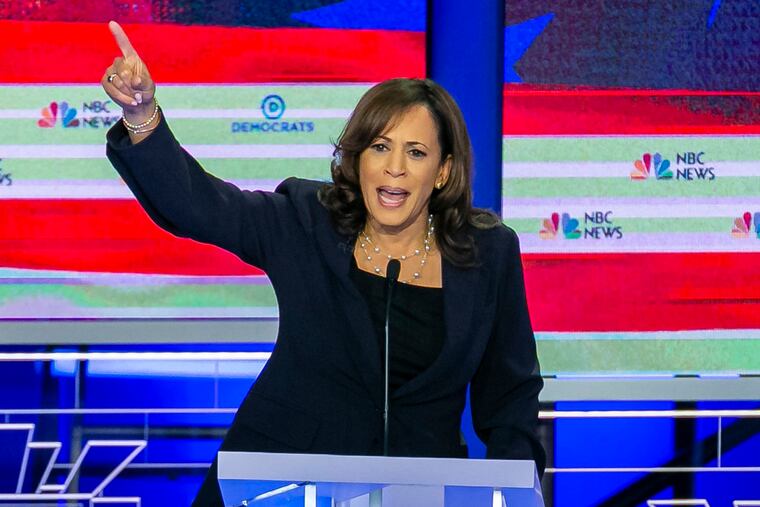How can presidential candidates be so silly? | George Will
Many of the Democratic presidential aspirants, snug in their intellectual silos, have lost -- if they ever had -- an aptitude for talking like, and to, normal Americans.

WASHINGTON -- If California Sen. Kamala Harris is elected president in 2020 and reelected in 2024, by the time she leaves office 114 months from now she might have a coherent answer to the question of whether Americans should be forbidden to have what 217 million of them currently have: private health insurance. Her 22 weeks of contradictory statements, and her Trumpian meretriciousness about her contradictions, reveal a frivolity about upending health care's complex 18% of America's economy. And her bumblings illustrate how many of the Democratic presidential aspirants, snug in their intellectual silos, have lost -- if they ever had -- an aptitude for talking like, and to, normal Americans.
Seven days after announcing her candidacy in January, Harris, appearing on CNN, endorsed "Medicare for All" and was asked: So, people "who like their [private] insurance, they don't get to keep it?" She answered: "The idea is that everyone gets access to medical care, and you don't have to go through the process of going through an insurance company, having them give you approval, going through the paperwork, all of the delay that may require. ... Let's eliminate all of that." More government, less paperwork. Really.
She subsequently, as The New York Times -- not an unsympathetic auditor of her campaign -- says, "waffled" regarding private insurance. But at the second Miami debate she raised her hand ("just as quickly as Mr. Sanders," the Times reported) when a moderator asked: "Many people watching at home have health insurance through their employer. Who here would abolish their private insurance in favor of a government-run plan?" Harris also raised her hand just as quickly as Sen. Elizabeth Warren had done the night before, who exclaimed "I'm with Bernie." Sen. Bernie Sanders is the purest advocate of a government-only health care system.
The next morning on MSNBC, Harris said "No, I do not" support ending private health insurance, claiming that she heard the pronoun "their" in the debate moderator's question (see the paragraph above) as an ungrammatical reference to each individual candidate. This alibi might be less implausible if she had not recently said, in a detailed response to a Times inquiry about her health insurance policy, that she favored abolishing private insurance.
One cannot unring a bell and Harris cannot erase the fact that she has repeatedly said she wants to take from 217 million Americans -- 80 million more than voted in 2016 -- something most of them like. And she is striking at a core function of organized labor, which is to negotiate employer-provided health care as untaxed compensation.
Equally maladroit was her debate decision to wrap herself in an unpopular policy that ended 20 years ago. Nothing did more to fuel the conservative ascendancy in the 1980s than the 1970s enthusiasm of some judges and politicians for the compulsory busing of (other people's) children away from their neighborhood schools, assigning children to schools on the basis of skin color in order to engineer a desired racial balance. In a 1973 Gallup poll, just 4% of whites and 9% of blacks chose busing from among a variety of means of achieving integration.
Yet Harris chose this issue as a cudgel with which to bludgeon Joe Biden. He, evidently lacking the courage of what once supposedly were his convictions, had neither the gumption nor the mental nimbleness to ask her whether, as president, she would favor reviving the compulsory busing of children away from homes that many parents, black and white, purchased because of their proximity to desirable neighborhood schools. Biden is becoming a conviction contortionist, as with his retreat from 40 years of support for the Hyde Amendment. Suddenly he favors federal funding of abortions -- forcing many taxpayers to be complicit in a practice they abhor.
Many Democrats striving to replace Donald Trump are, while execrating him, paying him the sincerest form of flattery: imitation. He prepared to campaign for president by calling America a "hellhole" and he began his presidency with an inaugural address that his would-be replacements are mimicking with their versions of his trope about "American carnage."
The day the Supreme Court held that "partisan gerrymandering" is not a justiciable issue, Massachusetts Rep. Seth Moulton, yet another presidential candidate, tweeted: "Make no mistake: the partisan gerrymandering SCOTUS just allowed is also racial gerrymandering -- modern-day Jim Crow. Just look at what happened with Stacey Abrams last cycle in Georgia." Abrams lost a gubernatorial race. How can a statewide race be gerrymandered? How can presidential candidates be so silly?
George F. Will writes a twice-weekly column on politics and domestic and foreign affairs. He began his column with The Washington Post in 1974, and he received the Pulitzer Prize for commentary in 1977. His latest book, “The Conservative Sensibility,” was released in June 2019. @georgewill